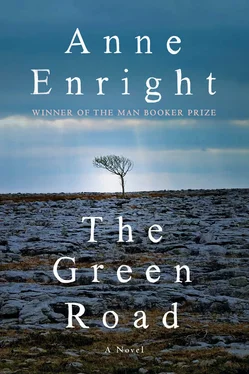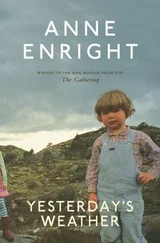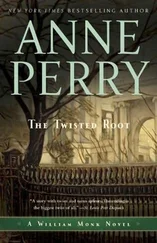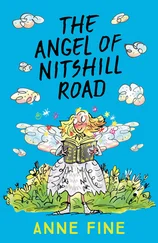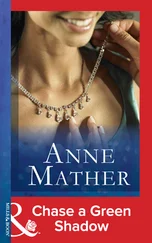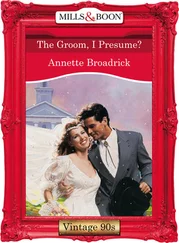Constance went out to the pantry with some empty bottles, trying to make the place look decent, and she knew this was a bit mad but it was also allowed. Constance was allowed . She felt almost light-hearted.
The passageway beyond the kitchen was very cold. There was a cardboard box against the wall and Constance put the bottles into it. The place smelt the way it always had: musty, with some creosote in there, and the sweetness of old apples. As she straightened up, she remembered her mother standing at the back door, looking out at the summer rain. It must have been when Constance was a child.
She could see it still: her mother’s silhouette in the doorway; beyond her, the red of poppies, the green of the garden, the air golden with shining rain. Rosaleen standing, looking out at it all, waiting to leave.
It was nearly ten o’clock on the evening of Christmas Day; a still enough night, with no rain. Emmet had a map spread out on the table and he marked out sections and roads with bold arrows and circles. He took mobile numbers, checked for torches; he was on the brink of doling out malaria pills.
Three cars to the cliffs, one to the car park at Lahinch, another along the coast roads between Doolin and Liscannor, a phone call to a guy in Doolin to check the harbour car park, another car along the coast from Doolin to Fanore, the last to the high road from Ballinalackin to Ballynahown.
The house was filling up with people from the town. Dan saw men he had not seen since school. They eyed him carefully and then they touched him, a deliberate hand on his arm or shoulder, saying, ‘All right, Dan? Anything I can do?’ Down in the kitchen, four women were wiping the kitchen table, setting out bowls and plates of food covered in cling film. Dessie’s sister Imelda brought, among other things, two bags of coffee, and Constance had a weakness, she had to be helped to a chair.
‘Oh, oh, oh,’ she said as her legs gave way from under her, and she sat with her feet planted and a bag of Colombian grounds in her lap.
‘Oh,’ she said again, taking the blame for it all, the forgotten coffee, the hissy fit, her mother now wandering the night. ‘Oh.’
‘Oh, yeah what ,’ said Hanna, who was leaning against the range with her arms crossed, and there was nothing to be done with her except put her in one of the cars, she was no use to anyone at home.
‘Go,’ said Dan, so she stumbled out with Ferdy McGrath, a twist in his eye that said he would be able for her.
‘God, Ferdy, remember you used to coach me at camogie?’
‘I do,’ he said. ‘You had a great burst of speed.’
‘I had,’ she said. ‘That’s true. I did.’
And he put her in the passenger seat of his drinker’s jalopy and closed the door.
The cars put on their indicators and left, one after the other, heading west. Dan followed the sound of them out to the gate, and then went along the deserted road, looking for a phone signal. As soon as he got one, he rang home to Toronto, and when Ludo picked up he said, ‘My mother’s gone. She drove off. She could be anywhere.’
It was pitch black. Dan had walked away from the house and when the light went out on his phone, the night blinked and swallowed him. The darkness shifted, not to a place five feet away, but right up to his face. It stole his breath. He turned one way and then the other, and was not sure of his direction. Twenty yards away from the house and he did not know where he was, or how to return. He found the grass verge and shied away from the ditch beyond it, felt his way back by the sense of vegetation against his shoe and by the promise of a distant street light around a curve in the road. It took an unconscionably long time. He felt, at every step, as though he was walking into something, and he flinched away, taunted by the black air.
ROSALEEN STOPPED WHERE she was. Head low, swaying from side to side. She could not feel where the ground began and the flesh stopped, it was all one pain.
She had lost her glove. And that was a nuisance.
Rosaleen was a nuisance. Her children thought she was a nuisance because it was true. She was. A nuisance.
Rosaleen was a nightmare. She was very difficult. She was increasingly difficult. She made her children cry.
They’d be sorry, to find her gone. They would be very sorry. These people, who spent their entire time leaving her. Not ringing, not writing. They told her nothing, spent their lives getting out of there. Get out and keep going! that was the cry. Don’t turn back! If you turn back you will see your mother turned into a pillar of salt.
Well two could play at that game.
Rosaleen had two feet, she had a car. Rosaleen could also walk out that door and not come back. And how did that feel? How did it feel when your mother left you?
Hah!
The same, the same. It felt the same.
Rosaleen put the old head down, one knee in front of the other. She was on all fours and the stones were very sore under her. There was a shooting pain also in the flesh of her palm, a nerve thing. She took it up and shook it, but she could feel nothing of the hand itself, just the shooting pain, and a burning in her fingertips. She wanted to go back and find her glove, but she could not go back into all that — the pursuing darkness and the night.
She took the glove off her right hand and squeezed the cold hand into it, with the thumb twisted around the wrong way. There was a little ruin of a house up here, and she would be safe inside it. A little famine cottage she had passed many times, but whether it was near or far she could not tell. Everything was taking such a long time. Rosaleen did not think she would make it. She would die on the side of Knockauns mountain, they would find her cold and still in the morning light, and then they would be sorry.
And she was sorry too.
Her lovely children.
Why she could not be nice to them, she did not know. She loved them so much. Sometimes she looked at them and she was so flooded with love, she just had to go and spoil it. It made her angry in the after-wash. They were so beautiful. They used to be so beautiful. They were so trusting and good. It made her feel not good. Unappreciated. It made her feel irrelevant. That was it.
What about me? she said.
But Rosaleen did not exist. Oh no. Rosaleen did not matter.
Hah!
Rosaleen wanted to say it out loud but she couldn’t. She was stuck in the sound of her own breathing, dragging and rough, an immense clattering in her teeth when she pulled the air into her.
Fuh fuh fuh fuh fuh
The cold was inside her. It was in her bones, making its way into her flesh, it was wrapped around her innards, seeping into her stomach, her body tried to shake it out again. A deep trembling took hold and her arms and legs grew comical and stiff, she had to swing them high and down. After an endless long time of this, she realised the person beside her was Pat Madigan, it was his was the voice urging her on. And a great sense of peace spread through her then, followed by a jag of irritation.
Where have you been, all this time?
A MAN CALLED John Fairleigh walked in to the dining room in waterproofs and hiking boots. Young, black haired, weatherbeaten; he introduced himself and went straight to the map on the table, pushed away the silver and white baubles — but carefully — and said there were more on the way, the team would be here soon.
‘Any word?’ he said. And Dan looked at him.
‘No.’
‘Is this where she liked to go?’
Emmet looked at the map.
‘Somewhere on the coast. Somewhere. Walking in circles.’
John Fairleigh said he did not think so. Their mother was not walking in circles.
‘A woman of that age, she will be moving in a linear way. She will be near the car, definitely within a kilometre of the car, probably within a hundred metres. So the first job is to find the car. And when we find the car, it’s a hundred metres, a kilometre max.’
Читать дальше
